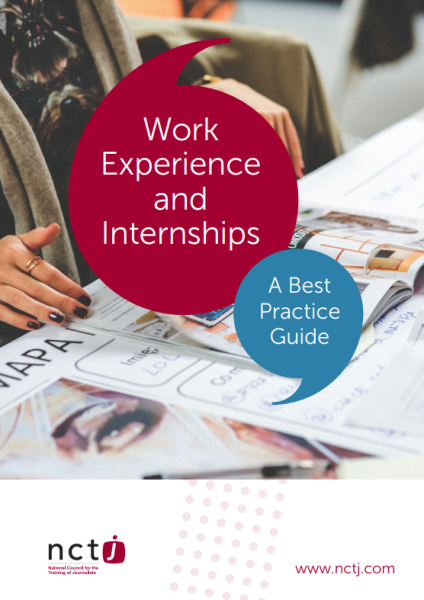
NCTJ publishes work experience best practice guide for employers
The NCTJ has published a best practice guide for work experience and internships for journalism employers, in a bid to tackle inequality.
The NCTJ has published a best practice guide for work experience and internships for journalism employers, in a bid to tackle inequality.
 The NCTJ has regularly argued that the existence of lengthy, unpaid – and often ad hoc – work experience placements in the media sector is both morally wrong, and can act as a barrier to entry.
The NCTJ has regularly argued that the existence of lengthy, unpaid – and often ad hoc – work experience placements in the media sector is both morally wrong, and can act as a barrier to entry.
In recent years it has become more widely understood that individuals from financially disadvantaged backgrounds can be excluded from placements due to associated living and travel costs.
The guide, which was launched at the NCTJ’s anniversary reception at UK Parliament on 6 July, aims to:
- End the practice of lengthy unpaid work placements (and any unpaid placements of over a day or two not undertaken within the context of an accredited training course)
- Ensure that work experience opportunities are appropriate and relevant to the people who undertake placements (and to those offering them)
- Encourage transparency and consistency of recruitment processes in the field of work experience
Joanna Webster, deputy global editor for visuals at Reuters, said: “Work experience is a critical first step into journalism yet it is often only available to people from the most privileged backgrounds.
“We all know that diverse newsrooms give us a deeper understanding of the world we cover and enhance our journalism. It’s therefore imperative that we work together as an industry to break down financial barriers to entry.
“This guide from the NCTJ provides us with the foundation to make work experience and insight opportunities more meaningful, to make recruitment more transparent and ensure opportunities are open to all.”
Abbie Scott, deputy managing editor at the Financial Times, said: “The Financial Times supports the NCTJ’s guide to work experience and their recommendations.
“It is vital that journalists at the beginning of their careers gain valuable work experience in newsrooms to support their development. Interns and trainee journalists at the FT and across the news industry make a valuable contribution and deserve to be treated fairly and paid appropriately.”
The NCTJ’s Diversity in Journalism report, published in May, found that 80 per cent of journalists had a parent in one of the three highest occupational groups, and only two per cent have a parent in the lowest two occupational groups.
Speaking at the NCTJ’s 70th anniversary reception at UK Parliament last week, Joanne Butcher, chief executive, said: “Short placements are fine to see if the job is for you or to hone your skills while you’re training. But we have to work together to stop lengthy unpaid internships and placements: they are morally wrong, illegal and unfair. Networks and wealth should not open doors that are shut to hard work or poverty.
“We need to encourage those from all walks of life into journalism roles, take down the barriers and support people in their careers so they can join the decision-makers.”

